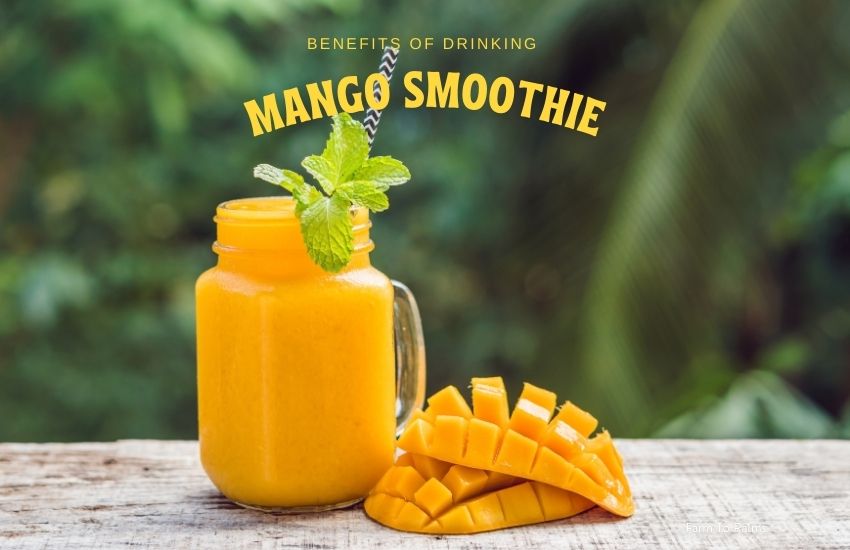What are the Benefits of Drinking Mango Smoothie?
Smoothies are a popular go-to for anyone looking to stay healthy while enjoying a delicious treat. But have you ever wondered what makes a mango smoothie particularly special? Hi, I’m Farm To Palms, and today, we’re diving into everything you need to know about drinking mango smoothies and how they can boost your health.
Not only are mangoes rich in flavor, but they’re also packed with vitamins like vitamins C, A, and E, as well as antioxidants and fiber. Whether you aim to improve your digestion, support your immune system, or indulge in something tasty low in calories, a mango smoothie might be precisely what you need. In this article, we’ll break down the nutritional benefits, provide some tips on how to enjoy mango smoothies, and even debunk common misconceptions.
Key Nutritional Benefits of Drinking Mango Smoothie
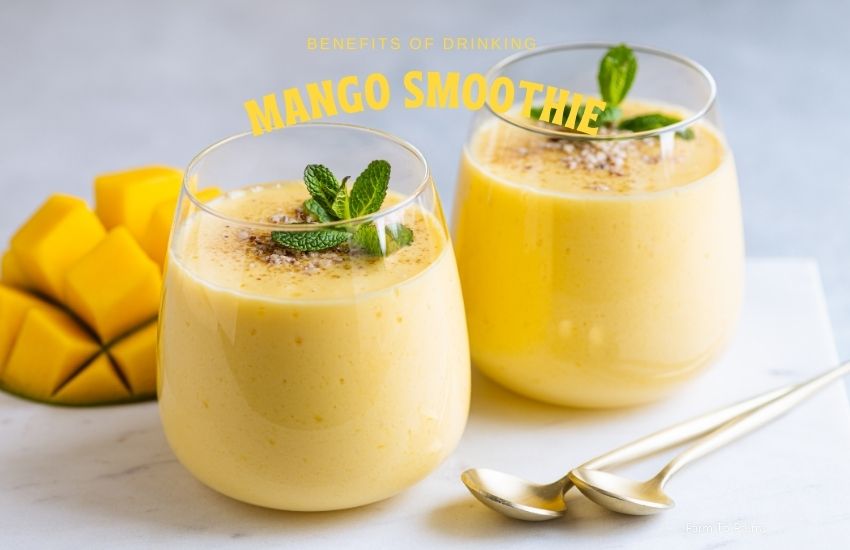
One of the first things to note about mango smoothies is their incredible nutritional profile. Just one cup of mango (about 165 grams) offers roughly 99 calories, 24.7 grams of carbs, and 2.6 grams of fiber. You’ll also find essential vitamins like vitamin C (67% of the daily value), vital for immune support, and vitamin A (10% of the daily value), essential for healthy vision.
But the benefits don’t stop there:
- Rich in Essential Vitamins (A, C, E): Mangoes are bursting with vitamins that promote good health. Vitamin C supports the immune system, while vitamin A is crucial in maintaining healthy skin and vision. Meanwhile, vitamin E works as an antioxidant that protects your cells.
- Packed with Antioxidants: Mangoes contain potent antioxidants like mangiferin, which protects your body from oxidative stress. Antioxidants are crucial because they help neutralize harmful free radicals, which can contribute to chronic diseases.
- High Fiber Content for Digestive Health: A mango smoothie could be the perfect addition to your diet to improve your digestion. Mangoes are high in dietary fiber, which helps maintain regular bowel movements and prevents constipation.
- Hydration and Energy Source: Mangoes contain a high percentage of water, making them an excellent option for staying hydrated. The natural sugars in the fruit provide an energy boost, making mango smoothies a fantastic pre-or post-workout snack.
Health Benefits of Mango Smoothies for Different Body Systems
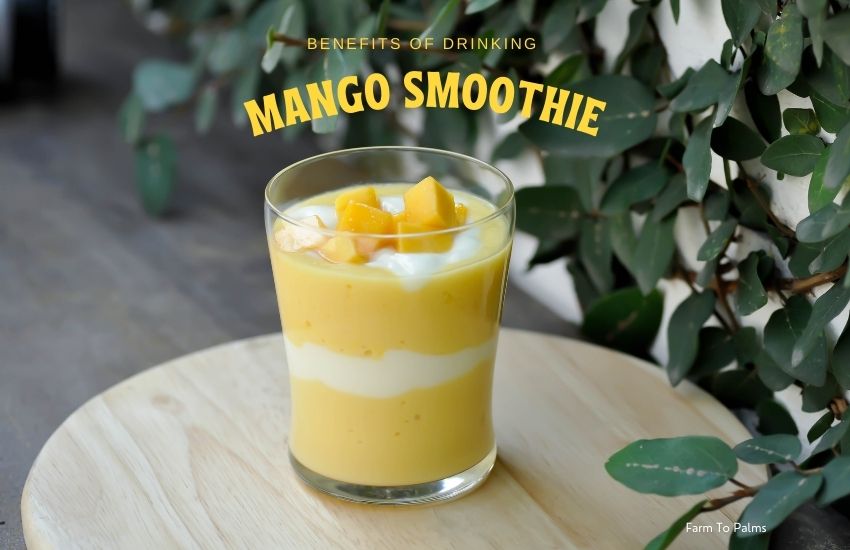
Mango smoothies don’t just taste good—they do wonders for your health.
- Boosts Immune System: Mangoes are rich in vitamin C, which strengthens the immune system by increasing the production of white blood cells. This helps your body fight off infections and stay healthy year-round.
- Supports Heart Health: Mango smoothies can help maintain a healthy heart thanks to their potassium and magnesium content, two minerals known for lowering blood pressure. These nutrients work together to ensure smooth blood flow, reducing the risk of heart disease.
- Promotes Eye Health: Mangoes contain lutein and zeaxanthin, two antioxidants that help protect your eyes from harmful blue light and reduce the risk of macular degeneration. Plus, the vitamin A in mango supports good vision, especially in low-light conditions.
- Improves Skin Health: Mango smoothies’ antioxidants and vitamin A work wonders for your skin. These nutrients can help fight signs of aging, promote collagen production, and keep your skin looking radiant.
Common Misconceptions About Mango Smoothies and How to Avoid Them
While mango smoothies are undoubtedly healthy, I often hear a few misconceptions about them. Let’s clear them up!
- Myth 1: Mango Smoothies Are Too High in Sugar
Mangoes indeed contain natural sugars, but that doesn’t make them unhealthy. The natural sugars in mangoes are balanced by their fiber content, which helps regulate how your body absorbs sugar. Pair it with a protein source like Greek yogurt or a handful of nuts to avoid an overly sweet smoothie. - Myth 2: Mango Smoothies Cause Weight Gain
Some people worry that drinking smoothies will lead to weight gain. However, when consumed in moderation and without added sugars, mango smoothies are relatively low in calories and can help with weight management. - Myth 3: Mango Smoothies Aren’t Suitable for Diabetics
Fresh mangoes can be part of a healthy diet for diabetics—in moderation. Keep an eye on portion sizes and avoid adding extra sweeteners to your smoothie.
How to Make a Nutritious Mango Smoothie
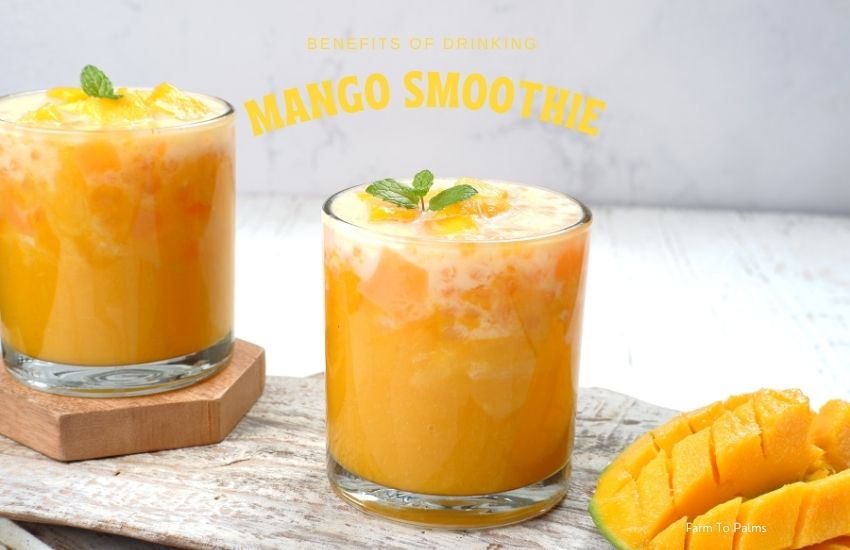
Let’s get practical! Making a mango smoothie at home is incredibly easy, giving you complete control over the ingredients. Here’s a simple recipe for a delicious and nutritious mango smoothie:
Ingredients:
- 1 cup fresh mango (165 grams)
- 1/2 cup Greek yogurt or almond milk
- 1 tablespoon chia seeds or flaxseeds
- A handful of ice cubes
- Optional: 1/2 banana or a handful of spinach for extra nutrients
Instructions:
- Peel and dice the mango.
- Add all ingredients to a blender.
- Blend until smooth and creamy.
- Pour into a glass and enjoy!
Adding chia seeds or flaxseeds adds extra fiber and omega-3 fatty acids, making this smoothie even more heart-healthy. You can also experiment by adding greens like spinach for an additional nutrient boost.
Recommended Daily Intake and Usage Guidelines for Mango Smoothies
To maximize the health benefits of your mango smoothie, it’s best to follow some daily intake guidelines:
- 1-2 cups per day is ideal for enjoying the benefits without consuming too much sugar.
- A mango smoothie can be enjoyed as part of your breakfast or as a refreshing post-workout drink to refuel your energy.
- For those watching their sugar intake, try blending mango with low-sugar fruits like berries or adding more protein-rich foods like yogurt or nuts to balance the sugars.
Potential Health Risks and Precautions When Drinking Mango Smoothies
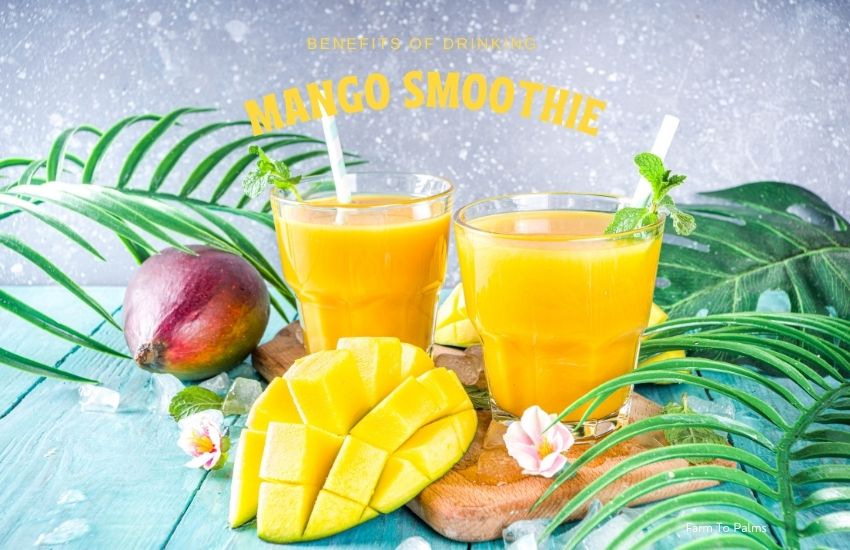
While mango smoothies are generally healthy, it’s essential to be aware of a few precautions:
- Added Sugars: Many store-bought smoothies contain added sugars, which can diminish the health benefits. Opt for homemade smoothies to keep sugar levels in check.
- Allergies: Some individuals may have allergic reactions to mango. If you’re trying it for the first time, start with a small amount to monitor for any responses.
- Dental Health: Because of their natural sugars, drinking mango smoothies frequently may contribute to tooth decay. Make sure to rinse your mouth after drinking them to prevent this.
Mango Smoothie Versatility and Recipe Ideas
If you’re looking for inspiration, here are a few fun variations of mango smoothies you can try:
- Tropical Mango Smoothie: Blend mango with pineapple and coconut water for a refreshing, tropical twist.
- Mango Protein Smoothie: Add a scoop of protein powder to boost your post-workout recovery.
- Green Mango Smoothie: Toss in some spinach or kale to increase your intake of leafy greens without altering the sweet, delicious taste.
Conclusion: The Benefits of Adding Mango Smoothies to Your Diet
In conclusion, mango smoothies are a delicious and nutritious way to support overall health. Their rich vitamin content, antioxidants, and fiber make them great for boosting immunity, improving digestion, and promoting heart and skin health.
If you’re interested in more healthy recipes and wellness tips, check out farmtopalms.com, and don’t forget to leave a comment or share this article if you found it helpful!

